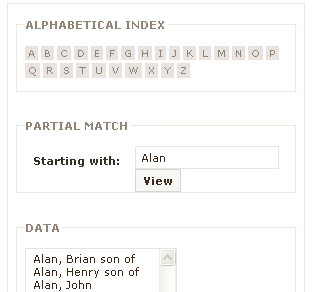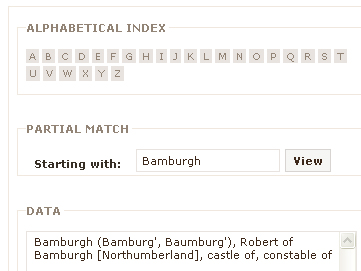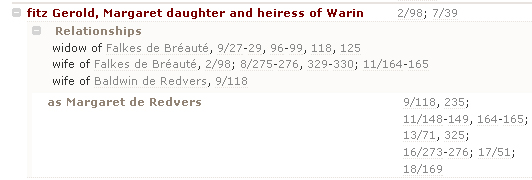Search
1. Introduction
This page explains how the different elements of the search function work. For a detailed demonstration of how to perform a search relating to a specific individual please see the Search Demonstration.
The search function enables users to perform a large number of searches on the people, places and subjects mentioned in the Fine Rolls, and to limit the search results by date.
Underlying the search function is a rich information structure using some of the new technical approaches more commonly associated with the ‘semantic web’ and other methods for representing data which are under development in the cultural heritage sector. You can find more information about this in the technical introduction.
This structure allows us to perform a wide range of complex scholarly queries on the material, such as searching for a combination of person/place/subject.
The facility allows users to search on three fields. Where more than one field is used search results only show instances where both/all terms are present (for instance results might be limited to entries where a specific person and a specific place occur).
2. Person
To restrict your search to a person mentioned in the Fine Rolls you can either:
- type in a name a full name, Christian name, surname, variant, relationship that may be part of the name (e.g. son), role that may be part of the name (e.g. sheriff)
- start typing and select a string from the auto-completion list
- click on the ‘Thesaurus’ button with the magnifier and select a specific person name (for advice on which see below).
You may also specify the maximum number of results to be displayed per page (20/50/100).
2.1. Anonymous individuals with Roles/individuals identified only by Christian name
A person currently indexed under a place in the index of perons can be found under his or her role in the search thesaurus ONLY if that person is anonymous, i.e. that the original manuscript does not attribute a name to that person and the editors have been unable to identify him or her. Otherwise, that person needs to be sought under his or her surname. In the thesaurus you will find ‘Bamburgh [Northumberland], castle of, constable of’ but NOT the named keeper ‘Brian son of Alan’. The fact he existed and acted as keeper is only found under his entry ‘Alan, Brian son of’ in the thesaurus, as can be seen in these accompanying shots from the thesaurus. These problems do not, however, any longer apply to individuals associated with roles in religious houses such as ‘Fécamp, abbot of’.
-

- Thesaurus entry for “Brian son of Alan“.
-

- Thesaurus entry for “Bamburgh“.
If, however, the individual concerned does not have a surname he or she needs to be sought under their Christian name. So, ‘Auty, reeve of Coleby’ can only be found at present in the search thesaurus under ‘Auty’ rather than ‘Coleby [Lincolnshire], Auty, reeve of’.
'These issues are direct consequences of the editorial strategies adopted for the project and, in some cases, will be resolved once the search is further refined. For more details on the treatment of anonymous individuals visit the Indexing section of the Style Book.
2.2. Alternative name or identity
A recent innovation in the Fine Rolls indexes is the introduction of what we have called an ‘alternative name or identity’ in order to distinguish different appellations of individuals (most often women) over time and over multiple print volumes. Whereas formerly when an individual has been given an ‘alternative name’, as is the case for ‘Margaret, daughter of Warin fitz Gerold’ who later comes frequently to be identified as ‘Margaret de Redvers’, the thesaurus could be used to look only for occurences of the former (if ‘Redvers, Margaret de’ is selected) or the latter (if ‘fitz Gerold, Margaret daughter of Warin’ is selected), this problem has now been solved and searches can be made by both the primary and alternative identity of any individual and the same results will be retrieved. What follows is the index entry for Margaret.
-

- Person index entry for “Margaret, daughter of Warin fitz Gerold” showing her alternative name “Margaret de Redvers”.
3. Place
To restrict your search to a location mentioned in the Fine Rolls you can either
- type in a full place name or its variant
- start typing and select a string from the auto-completion list
- click on the 'Thesaurus' button with the magnifier and select a specific place name.
It is now also possible to search the Fine Rolls for a place within a place whether the latter place is mentioned within the rolls or not. To do this you should type the name of the place you are interested in as free text in the Places search and check the 'Show places within' box. An example is shown in the Search Demonstration.
4. Subject
To search across the Fine Rolls for subjects as defined by the editors you can either:
- type in the name of a subject
- start typing and select a string from the auto-completion list
- click on the 'Thesaurus' button with the magnifier and select a specific subject.
5. Date Range
To limit results to a given range of years select a year from the drop down list both for the ‘Between’ and the ‘and’ fields; if you wish to select just one year, enter the same year in the 'Between' field and in the 'and' field.
6. Textual Input
6.1. Free Text
Free text search allows the location of specific words; all the text in the entries is searched. So if you search for 'Henry III king of England' you will get as search results entries where 'henry' and 'king' and 'england' occur. Searching is neither case nor accent nor sequence sensitive (thus 'burgh' and 'Burgh' will get the same results, as well as 'amercements respite of' and 'respite of amercements').
6.2. Auto-completion
While you type some text into a search field, an auto-completion list will pop up with a list of all the single words present in a person/place name or subject; so if you type 'a' in the Person field a list with persons whose names start with 'a' will appear as a menu to select from. You can then select an item from the list (which contains Christian names as well as textual variants or any component of a name) and get as search results any entry where these strings occur (so if you search for 'henry' selected from the auto-completion list you will get entries where ‘Henry III’ as well as ‘Henry II’ occur).
Note that if you use the browser Safari the auto-completion does not work properly at the moment; the list is displayed but the links do not work properly. We will fix this problem in the near future.
7. Thesauri
Thesauri are available for all fields by clicking on the button on the right-hand side of every field.
Thesauri index all the authorities (person, place, subject) present in the Fine Rolls; you can select a letter, then choose the item you are interested in, click on ‘Insert’ and close the thesaurus. The item will be now inserted in the relevant field. Clicking on ‘Search’ you will get as results any entry where that specific authority occurs (so if you search for 'Henry III, King of England' selected from the thesaurus for persons you will get only entries where Henry III occurs).
Searching based on Thesauri is case sensitive: this means for example that 'burgh' won’t find 'Burgh'.
In the thesaurus for persons, Christian names are included only if that person is not known by any other information (e.g. first Agnes in the thesaurus is a prioress indexed under the religious house in the current index of persons on the web). In the thesaurus for places, textual variants can also be selected.
8. Search Results
Clicking on 'Search' will generate a list of individual entries; by default only twenty results per page will be shown; where there are more than twenty, use the 'Next' button to see more results, or choose a specific range (20/50/100) from the search page.
Results are sorted chronologically.
You can already see the text of the entries in the search results page with the terms searched for highlighted in bold. However, it is recommended to visualize any individual entries by clicking on its headings and get to the corresponding entries, since in the form of the translation in the roll context you can also visualise any editorial note and proper punctuation; these entries will open in a new window.
If you wish to amend your search rather than start a new one, select 'Refine search' on the results page or use the back button of your browser.
9. Important search tips
- It is not possible to perform a search without specifying at least one search criterion.
- It is possible to search against single or multiple fields.
- It is possible to search for more than one item per field (e.g. search for entries where both Godfrey of Crowcombe and Ralph de Bray are mentioned).